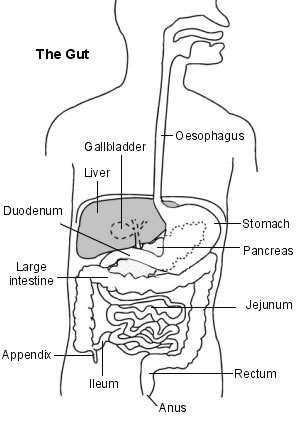As a Gut Health advocate, it felt fitting to start off my first blog post for Meaghers discussing my favorite product, Symprove… I have a lot to say about this product so it might take more than 1 post!
I personally like to know what I am taking, why I am taking it and what exactly it does in my body. I love learning new things and then passing this knowledge on. So, once I began to feel better after a few weeks of initially taking Symprove last year, I wanted to understand why so I could pass this onto clients and friends. I apply this same approach to my personal training clients who all know what and why they’re doing a specific programme or exercise, not just going through the motions. In a world of fads and trends I believe it is so important to arm ourselves with as much knowledge as possible to form our own opinions.
This is a synopsis of information I’ve found and gathered on your gut and how it works, combined with a breakdown of the educational material supplied by the Meaghers and Symprove teams along with my own personal experiences of taking Symprove for the past year and a half.
I’ve broken this blog into three parts
-
What exactly is your gut, how it works and why maintaining its health is so important.
-
What Symprove is and why it’s different to everything else on the market
-
Why I personally love it and my own experiences from taking it
What exactly is your gut? how does it work? and why is maintaining the health of it so important.
In order to understand just why the health of our gut is vital to our overall health , we first need to understand what it’s comprised of and it’s roles / functions that contribute to the efficient running of our body’s systems.
So what is your gut comprised of exactly?
The gastrointestinal tract aka “The Gut” is a long tube that starts at the mouth and ends at the anus.

In the simple terms, when we eat, food passes down the oesophagus into the stomach, and then into the small intestine. The small intestine is broken into three sections - the duodenum, jejunum and ileum. The small intestine is the place where food is digested and absorbed into the bloodstream. (I will come back to this part). Following on is the first part of the large intestine, which has the appendix attached to it, it continues upwards from here and is known as the ascending colon. The next part of the gut is called the transverse colon because it crosses the body. It then becomes the descending colon as it heads downwards.
The sigmoid colon is the s-shaped final part of the colon which leads on to the rectum.
Still with me? Ok so let’s go back to the small intestine and the digestion and absorption of food / nutrients into the bloodstream because it’s this area that’s of most interest to me due to the links between it and digestives issues such as, IBS.
The lining of the intestines has a huge surface area and when it is in full working order it forms a barrier that acts as a control as to what exactly gets absorbed into our bloodstream. Unfortunately for many of us whether we are aware of it or not, have guts that are not in optimal health and this means that we could have large cracks or holes along the lining which allows, partially digested food, toxins and bugs to enter into our bloodstream and the surrounding tissues causing inflammation and changing the internal balance of the flora within us.
The direct relationship and roles that leaky guts play in many common chronic diseases are widely researched. We all have some level of a leaky gut as the barrier was never meant to be completely impenetrable. Whilst for some of us our DNA and genetic make-up plays a role in our sensitivity to changes in our digestive system, a large part of the issue is today’s modern life. Unhealthy diets high in sugar and saturated fats and low in fibre, along with alcohol, stress, processed foods, antibiotic overuse and a lack of exercise can all now be linked to an unhealthy gut. An increase in the level of permeability of the gut wall plays a role in gastro conditions such as celiac disease, Crohn’s disease, and irritable bowel syndrome.
Having attended many of Symprove and Meagher’s Gut Health events and hearing all about the research with medical studies and corresponding results ( check out this link to the Symprove website for more information) on the effects of a unhealthy / leaky gut on so many conditions from Parkinson’s to depression, why wouldn’t you want to make sure that your gut is as healthy as it can be.
For me personally, once I had an understanding of how the gut worked and the effects an unhealthy one can have, I made it a priority to give myself the best defence against illness. In the words of Symprove’s founder Barry Smith, the gut is like the plumbing system of your house. You can have a pretty house with fancy windows and doors, with beautiful hanging baskets and curtains but if that house has a blockage in the pipes and you just ignore it, it will eventually lead to leaks and cracks and the internal running of the house will slow down and stop causing all sorts of havoc that no amount of cosmetic work will cover up.
How can we help prevent leaky gut and optimise our gut health?
let’s take a look at what’s inside our GI tract and how it impacts us on a daily basis and then we can figure out what affects it.
Have you heard of the word microbiome? If you haven’t heard about it yet trust me you will, everyone will soon jump on the biome band wagon claiming their product has gut healing powers.
Your microbiome is a massive eco system made up of trillions of organisms (bacteria, fungi and viruses) that all live in your digestive tract. Collectively they weigh 2 KILOS and yes you read that right, in fact they weigh more than your brain! Your body actually contains more bacterial cells than human cells. We call these good microbes’ “probiotics”
Why should you care about your Microbiome?
Many of these trillion microbes are essential for your health and can influence so many things in your body, digestion, defend against pathogens, support detoxification, break down complex carbohydrates, teach your immune system, affect your performance levels in sports and even your emotions. Yes, your emotions. Did you know that 90% of the “happy hormone” aka serotonin is made in your GI tract? Serotonin regulates mood, depression and anxiety. Why do you think so many terms such as trust your gut, your gut instinct, and happy gut happy life have come from? Think about it, our guts are pretty amazing and we are only on the cusp of discovering what these microbes can do, after all there are TRILLIONS of them and your gut microbiome is as dense and diverse as the amazon rainforest. Scientists are now treating the gut as its own organ, even a second brain. As I mentioned before whilst a majority of our biome make up is influenced from birth there are a lot of outside factors that can influence it on a daily basis such as, diet, stress, antibiotics and exercise.
Good sleep, a good diet and plenty of exercise coupled with playing outside and exposure to animals / dirt all reportedly help with the delicate balance between good and bad microbes. However, today for the vast majority of people this just isn’t viable, busy work schedules, processed convenience food, modern transportation, social media, technology and overuse of antibiotics means that we cannot support our gut like we are supposed to. This is where live bacteria supplements such as Symprove can help.
Check out my second blog here to see why Symprove is different to everything else on the market and why I will always continue to take Symprove.



